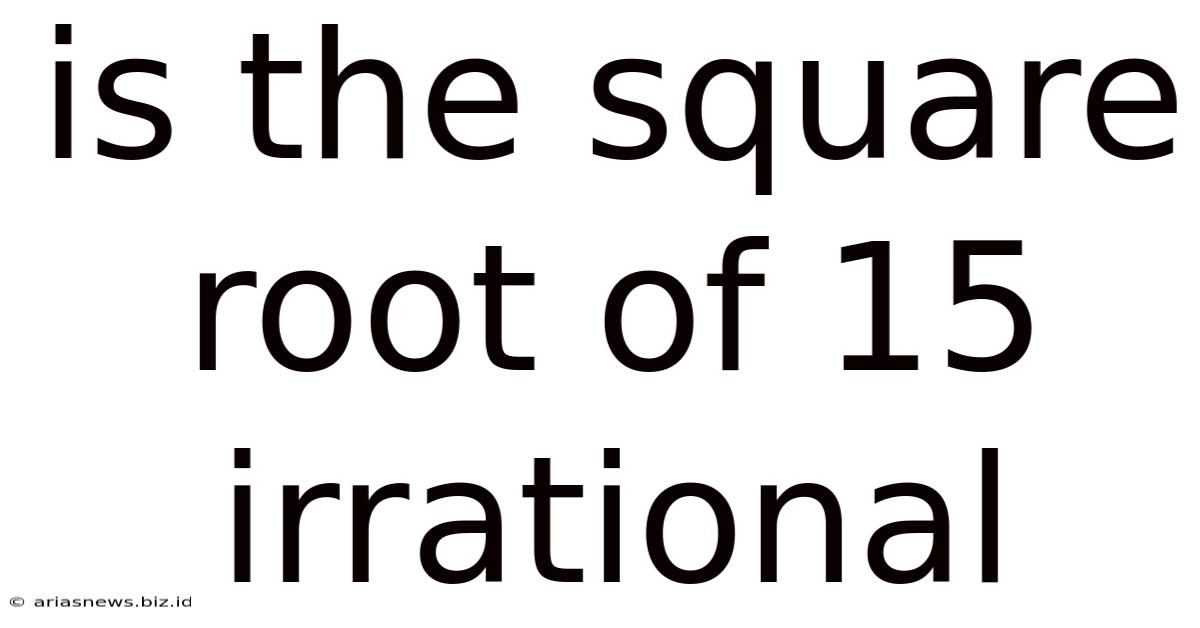Is The Square Root Of 15 Irrational
Arias News
May 12, 2025 · 5 min read

Table of Contents
Is the Square Root of 15 Irrational? A Deep Dive into Number Theory
The question of whether the square root of 15 is irrational might seem simple at first glance. However, delving into this seemingly straightforward problem opens a fascinating window into the world of number theory, exploring concepts like prime factorization, rational and irrational numbers, and proof by contradiction. This article will not only answer the question definitively but also provide a thorough understanding of the underlying mathematical principles involved.
Understanding Rational and Irrational Numbers
Before tackling the square root of 15, let's establish a clear definition of rational and irrational numbers.
Rational numbers can be expressed as a fraction p/q, where p and q are integers, and q is not zero. Examples include 1/2, 3/4, -2/5, and even integers like 5 (which can be expressed as 5/1). These numbers can be represented precisely as either terminating or repeating decimals.
Irrational numbers cannot be expressed as a fraction of two integers. Their decimal representations are non-terminating and non-repeating. Famous examples include π (pi) and e (Euler's number). The square root of any non-perfect square is also an irrational number.
Prime Factorization and Perfect Squares
The concept of prime factorization is crucial in determining whether a number has a rational square root. Prime factorization involves expressing a number as a product of its prime factors. A perfect square is a number that can be obtained by squaring an integer. For example, 9 is a perfect square because it's 3², and 16 is a perfect square because it's 4². Crucially, the prime factorization of a perfect square will always have even exponents for all its prime factors.
Let's analyze the prime factorization of 15:
15 = 3 x 5
Notice that both 3 and 5 have an exponent of 1. Since the exponents are not even, 15 is not a perfect square.
Proving the Irrationality of √15
Now, let's rigorously prove that the square root of 15 is irrational using the method of proof by contradiction.
Proof by Contradiction:
-
Assumption: Let's assume, for the sake of contradiction, that √15 is a rational number. This means it can be expressed as a fraction p/q, where p and q are integers, q ≠ 0, and p and q are coprime (meaning they share no common factors other than 1).
-
Equation: If √15 = p/q, then squaring both sides gives us:
15 = p²/q²
-
Rearrangement: Rearranging the equation, we get:
15q² = p²
-
Divisibility by 3: This equation implies that p² is divisible by 15, which means it's divisible by both 3 and 5 (since 15 = 3 x 5). If p² is divisible by 3, then p must also be divisible by 3 (because 3 is a prime number). We can express this as p = 3k, where k is an integer.
-
Substitution: Substituting p = 3k into the equation 15q² = p², we get:
15q² = (3k)² 15q² = 9k² 5q² = 3k²
-
Divisibility by 5: This equation implies that 3k² is divisible by 5. Since 3 is not divisible by 5, k² must be divisible by 5, and therefore k must be divisible by 5. We can express this as k = 5m, where m is an integer.
-
Contradiction: Substituting k = 5m into p = 3k, we get p = 3(5m) = 15m. So, both p and q are divisible by 15. This contradicts our initial assumption that p and q are coprime.
-
Conclusion: Since our initial assumption leads to a contradiction, the assumption that √15 is rational must be false. Therefore, √15 is irrational.
Exploring Further: Generalization and Other Irrational Numbers
The method used to prove the irrationality of √15 can be generalized to prove the irrationality of the square root of any non-perfect square integer. The key lies in the prime factorization and the resulting contradiction when assuming rationality.
Many other numbers are proven to be irrational using similar techniques or different approaches. Consider:
- √2: The most famous example, often used as an introductory proof in number theory courses.
- √3: Similar proof structure to √15.
- √n, where n is not a perfect square: The general case, proven by contradiction like √15.
- e (Euler's number): Proven irrational using continued fractions.
- π (pi): The proof of π's irrationality is more complex and involves advanced mathematical analysis.
Practical Implications and Conclusion
While the concept of irrational numbers might seem abstract, it has significant implications in various fields:
- Geometry: Irrational numbers are essential for precise measurements and calculations involving circles, triangles, and other geometric shapes.
- Physics: Many physical constants and calculations involve irrational numbers, representing quantities that cannot be expressed precisely as fractions.
- Computer Science: Approximating irrational numbers is a key challenge in computer science, influencing precision and computation time.
In conclusion, the square root of 15 is indeed irrational. This demonstration not only answers the initial question but also provides a deeper understanding of the fundamental concepts in number theory and the elegant power of proof by contradiction. The ability to rigorously prove the irrationality of a number demonstrates the precision and beauty of mathematics. Understanding these concepts lays a solid foundation for exploring more advanced mathematical ideas and applications. The exploration of rational and irrational numbers serves as a testament to the intricacies and fascinating nature of the mathematical world.
Latest Posts
Related Post
Thank you for visiting our website which covers about Is The Square Root Of 15 Irrational . We hope the information provided has been useful to you. Feel free to contact us if you have any questions or need further assistance. See you next time and don't miss to bookmark.